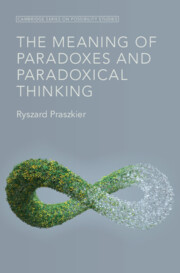Book contents
- The Meaning of Paradoxes and Paradoxical Thinking
- Cambridge series on possibility studies
- The Meaning of Paradoxes and Paradoxical Thinking
- Copyright page
- Contents
- Figures
- Tables
- Acknowledgments
- Introduction
- Part 1 Paradoxes and What They Do to Us
- Part II Sudden Unexpected Changes
- Part III Challenging the Impossible
- Introduction
- Chapter 8 Possibilitivity
- Chapter 9 Possibilitivity Heroes
- Discussion and Summary
- Part IV Peace and Its Challenges
- Part V Paradoxes and Creativity
- Part VI Paradoxes in Action
- References
- Index
Chapter 8 - Possibilitivity
Perceiving Insurmountable Challenges as Doable
from Part III - Challenging the Impossible
Published online by Cambridge University Press: 04 April 2025
- The Meaning of Paradoxes and Paradoxical Thinking
- Cambridge series on possibility studies
- The Meaning of Paradoxes and Paradoxical Thinking
- Copyright page
- Contents
- Figures
- Tables
- Acknowledgments
- Introduction
- Part 1 Paradoxes and What They Do to Us
- Part II Sudden Unexpected Changes
- Part III Challenging the Impossible
- Introduction
- Chapter 8 Possibilitivity
- Chapter 9 Possibilitivity Heroes
- Discussion and Summary
- Part IV Peace and Its Challenges
- Part V Paradoxes and Creativity
- Part VI Paradoxes in Action
- References
- Index
Summary
Prior to introducing the new concept of possibilitivity (i.e., perceiving challenges as doable), the related notions are presented: self-efficacy, locus of control, perception of the malleability and plasticity of other people and the world, need for achievement, and optimism. A “laying the ground for addressing the impossible” model is presented, also in a graphical form. The concept of possibilitivity (a portmanteau of “possible” with “creativity,” echoing the pronunciation of ‘realizability’) is defined as the degree of conviction that even insurmountable challenges are achievable. Possibilitivity is distinguished from the tendency of uninformed novices to overestimate their own abilities, a phenomenon known as Dunning–Kruger syndrome. Possibilitivity represents the ultimate stage, following the phases of thinking the impossible, intending the impossible, and exceeding oneself, leading to the execution of paradoxical actions aimed at turning the impossible into the possible. Next, the Perception of Doability Questionnaire (PoDQ) is presented, based on a projective life stories approach: for each life-story respondents were asked to answer eight questions. In the validation process the questionnaire achieved good psychometric qualities.
Keywords
- Type
- Chapter
- Information
- The Meaning of Paradoxes and Paradoxical Thinking , pp. 66 - 73Publisher: Cambridge University PressPrint publication year: 2025

